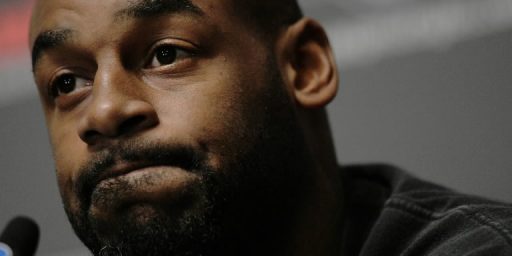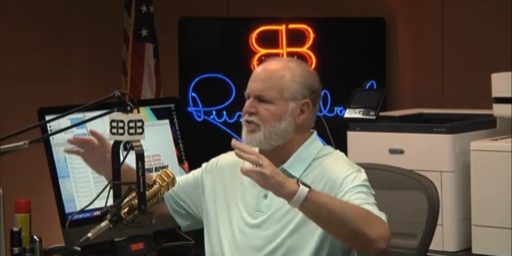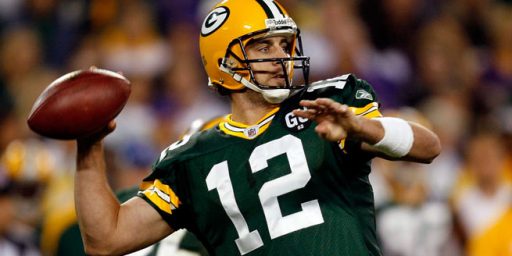BLACK QB BIAS?
Jacob L. Vigdor, writing in TAP, presents a rather bizarre finding:
Rush Limbaugh’s resignation from ESPN last week has generated plenty of debate over whether the right-wing radio personality was spouting racist garbage — or courageously speaking the truth — when he said Philadelphia Eagles quarterback Donovan McNabb was overrated because McNabb is black. Limbaugh said that McNabb’s stellar reputation is less a result of on-field performance than of liberal media bias. “I think what we’ve had here is a little social concern in the NFL,” Limbaugh said during the Sept. 28 edition of ESPN’s Sunday NFL Countdown. “I think the media has been very desirous that a black quarterback do well.” But if Limbaugh had done any research on the subject, he would have learned that the media’s desire to see black quarterbacks succeed is not rooted in “a little social concern,” but rather in good old-fashioned attention to the bottom line.
Last year, along with fellow Duke University economists Peter Arcidiacono and Eric Aldrich, I published an analysis of Neilsen ratings for Monday Night Football broadcasts on ABC from 1997 through 2001. We were interested in determining the factors that drew viewers to different games. Many of the results will be quite intuitive to football fans: Teams representing larger markets drew more viewers, as did teams with better records and more productive offenses. But we also found that viewership increased significantly when at least one team started a black player at quarterback. Even restricting our attention to teams that sometimes started a white quarterback and sometimes started a black quarterback, the games with black quarterbacks drew more viewers. Economically speaking, the effect was so large that any halfway competent network executive would have to take notice. Games with black quarterbacks drew an extra 2 million viewers, on average. Extra viewers, of course, translate directly into extra advertising revenue.
The skeptics out there will wonder if it was really the black quarterbacks that fans were tuning in to see. We were skeptical, too. After all, previous research on race and sports viewership has suggested the opposite effect — attendance and viewership of basketball games, for example, increase when games feature more white players. But we noticed a few things. The “black quarterback effect,” as we called it, persists even after controlling for more objective measures of quarterback quality, such as passing efficiency. It is most pronounced among females and young adult males, cohorts that express racially tolerant attitudes on social surveys. We also noted that black NFL quarterbacks appear in a role where they have often been underrepresented — one could make the same argument about white basketball players, at least in recent decades.
***
Whether or not Limbaugh was right about McNabb’s playing ability, his implications about the motives of the media were wrong. The networks have figured out something that he hasn’t, namely that the racial tolerance of the American public has increased dramatically over the past 20 years, at least in the world of sports. With this tolerance has come a true preference for diversity. Those blind to these changes must resort to the amorphous concept of liberal bias as the only rational explanation for media behavior. Those who better understand what’s going on in America know that a more traditional value — the desire to maximize profits — is the real explanation.
It’s rather difficult to argue against quantitative analysis with mere logic. Still, I find the conclusion rather difficult to swallow.
From a statistical standpoint, we have an incredible small N problem. There are only 17 weeks in the NFL season and thus only 17 MNF games a year. So, in the five years surveyed, we have only 85 games. How many of those games featured a black quarterback? How many unique black quarterbacks were featured among those? It seems much more likely that fans were tuning in to see exciting quarterbacks–say, Randal Cunningham, Donovan McNabb, Daunte Culpepper, or Mike Vike–rather than black quarterbacks per se. Indeed, I suspect that if ABC were to schedule a game pitting Jeff Blake and the Arizona Cardinals and Rodney Peete of the Carolina Panthers against one another, the ratings would tank.
Cross-posted at SportsBlog






You know, one of the reasons we all take such an interest in Tiger Woods is that he’s young and multi-racial. Awesome player, too…but it’s the whole thing…
True on Tiger, at least early on. But a black golfer is a phenomenon; not so much a black football player.
James your points are well taken but throw some more “figuring” into the pot.
You say people tune-in more to see exciting QB’s and that is obviously true. But that is strongly tempered by the fact that MNF ALWAYS wants exciting games and selects the match-ups to try to produce them. The “excitement factor” should therefor be leveled. (unless a good black quarterback excites people more???)
Your points about the dataset are well taken but 85 is a lot for T. V. Often T.V. viewing is often measured with a single data point. If Whoopi Goldberg bombs hosting the Oscar’s she won’t be asked back a second time….
…unless she can complete a 65 yard touchdown strike to Randy Moss in the end zone.